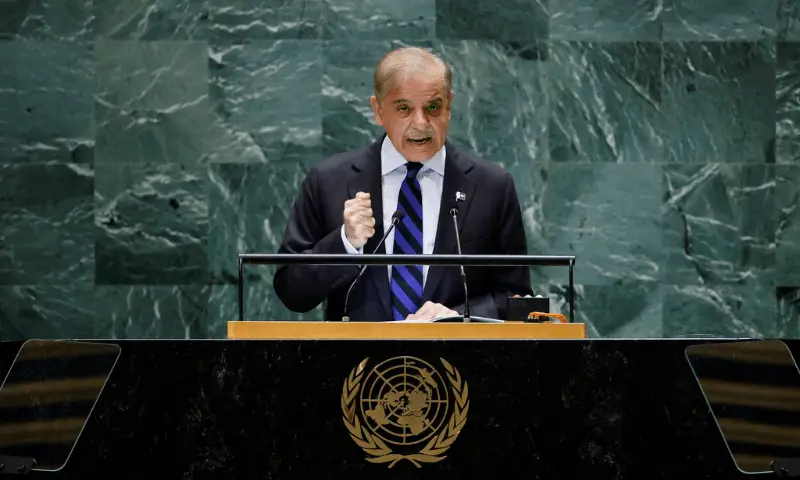Calls for Urgent Ceasefire in Gaza Conflict
At the 79th session of the United Nations General Assembly (UNGA) in New York, Prime Minister Shahbaz Sharif demanded an early cessation to the Israeli military onslaught in Gaza, characterizing it as “systematic slaughter” and “bloodshed.” Speaking as the second leader in the UN General Debate, Sharif said, “This is not just a conflict, this is a systematic slaughter of innocent Palestinians,” and he sharply condemned Israel’s conduct. He underlined that the international community needs to act quickly to confront the humanitarian catastrophe that is developing in Gaza.
Declaring, “It is not enough to condemn, we must act now and demand an immediate end to this bloodshed,” Sharif pleaded with world leaders to take prompt action. He insisted that Palestine be granted full membership in the UN and restated Pakistan’s support for a two-state solution.
Global and Regional Tensions Discussed
In his speech, Sharif emphasised a number of other urgent international issues, such as the continuing conflict in Ukraine, rising geopolitical tensions, and climate change. He underlined the threat posed by Israel’s ceaseless bombing of Gaza and Lebanon and cautioned against the perils of ignoring these international issues. The failure to carry out UN resolutions, according to Sharif, has strengthened Israel and raised the possibility of further escalation throughout the Middle East. Sharif expressed grave concern about the possible outcomes of this violence.
Following Sharif’s speech, Pakistan’s delegation staged a symbolic walkout to demonstrate their opposition to Israel’s policies as Israeli Prime Minister Benjamin Netanyahu ascended the podium.
India’s Actions in Kashmir Also Targeted
Sharif did not restrict his condemnation of Israel in his address. Additionally, he denounced India’s conduct in Jammu and Kashmir and charged that it was carrying out a “classic settler-colonial project” there. After India changed the status of the disputed area unilaterally on August 5, 2019, Sharif said that India had violated resolutions of the UN Security Council and imposed “draconian measures” on the Kashmiri populace.
Sharif declared that New Delhi’s actions will eventually backfire, as they did for previous occupying forces throughout history, and accused India of trying to change the demographic composition of Jammu and Kashmir by putting outsiders in the area. He reiterated Pakistan’s support for the cause of Kashmir and made it clear that Pakistan will react “decisively” to any Indian military assault.
Bilateral Meetings with World Leaders
Sharif spoke with world leaders, including his colleagues from Nepal and Iraq, on the fringes of the UNGA. During his meeting with Prime Minister K.P. Sharma Oli of Nepal, Sharif conveyed Pakistan’s intention to fortify bilateral collaboration in several domains, and the two leaders reaffirmed their dedication to augmenting regional connections.
Sharif also met with Iraq’s Prime Minister Mohammed Shia Al-Sudani, where they discussed efforts to improve existing bilateral relations and international efforts to support an immediate ceasefire in Gaza. Both leaders agreed to collaborate within international platforms such as the UN and the Organization of Islamic Cooperation (OIC) to bring an end to the violence.
Economic Cooperation with American Banks
Regarding the financial sphere, Sharif had a meeting with a group of well-known American Pakistani financiers, which included officials from JP Morgan, Goldman Sachs, and other big banks. He extended an invitation to US banks to make investments in infrastructure, energy, technology, and agriculture—the country’s main economic sectors.
Sharif outlined his government’s key economic reforms aimed at stabilizing Pakistan’s macroeconomic environment and attracting foreign investments. He emphasized the establishment of a Sustainable Finance Framework, which would allow Pakistan to issue green bonds in international capital markets.
He has been attending high-level meetings since arriving in New York for the five-day tour. These sessions have included talks with officials from Iran, Palestine, Turkey, and the European Commission, with a focus on regional issues and global economic challenges.

